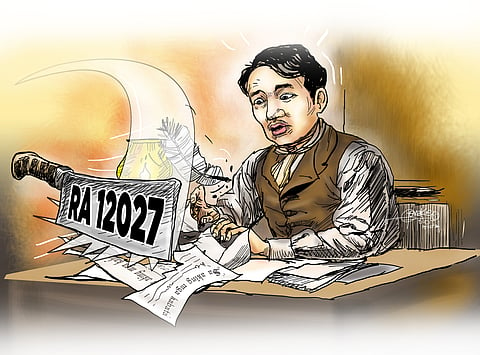
- NEWS
- the EDIT
- COMMENTARY
- BUSINESS
- LIFE
- SHOW
- ACTION
- GLOBAL GOALS
- SNAPS
- DYARYO TIRADA
- MORE

“Ang hindi magmahal sa sariling wika ay higit sa hayop at malansang isda. Kaya pagyamanin ng kusa tulad ng inang sa atin ay nagpala.”
Dr. Jose Rizal purportedly wrote the poem “Sa Aking Mga Kabata” in Filipino as a precocious eight-year-old, linking the concept of freedom to the use of one’s mother tongue. We say “purportedly” because serious doubts have been raised about our national hero’s authorship of the literary gem from which the lines above come.
First, there is no handwritten original of the poem among all the chronicles, diaries, and literary output that the prolific Rizal produced, mostly in Spanish, using his quill. Second, the piece was published long after his passing, and its genesis remains murky to this day.
Curiously, Sa Aking Mga Kabata mentions the word “kalayaan,” or freedom, twice. Why, then, did Rizal, as a 20-something student abroad, ask his brother for the translation of the word “freedom” into Filipino while he was adapting the story of William Tell for a children’s book in Tagalog? Didn’t he already use the word as an eight-year-old?
Then there’s the issue regarding “having K.” It is not whether he was capable at that tender age of writing a very mature-sounding and polished poem, but rather whether the letter “K” was already in use during that time. Historians could be accused of revisionism if they point out that if Rizal really penned it, then it should have been written this way: “Sa Aquing Mga Cabata.” Kalayaan would also be written as “calayaan.”
The debate, however, should not detract from the importance of a country like ours nurturing and actually using the mother tongue, especially in light of a proposed measure to discontinue Filipino as a medium of instruction from Kindergarten to Grade 3, providing for its optional implementation only in monolingual classes. The measure lapsed into law as (RA) 12027 last week without President Ferdinand Marcos Jr. having signed it.
While proponents of the law argue that it will improve the quality of education by ensuring that instruction is delivered in languages familiar to learners, critics contend that it undermines the importance of nurturing the mother tongue as a cornerstone of cultural identity and national unity.
Those in favor of the new law emphasize that the Philippines’ linguistic diversity, with so many major dialects, poses significant challenges in ensuring effective and equitable education. They argue that by transitioning to English earlier, students can develop a stronger foundation in the major language, widely used in various domains of life. Moreover, they believe that this approach will better prepare students for higher education and the global job market.
However, those opposed to the law raise concerns about the potential negative consequences of abandoning mother tongue instruction in the early years. They argue that language plays a crucial role in cognitive development, cultural transmission and emotional well-being.
Learning in the mother tongue provides students with a familiar and comfortable environment, fostering a sense of belonging and confidence. Additionally, they cite studies showing that students who receive early instruction in their native language tend to have better academic outcomes and stronger critical thinking skills.
As things stand, the conflicting views over RA 12027 has highlighted the broader issue of nurturing a Filipino language that can unify Filipinos across the nation. While Filipino has been designated as the national language, it remains relatively young with limited resources and usage compared to English. Promoting Filipino through education and other initiatives can help foster a sense of national identity and strengthen cultural ties among Filipinos from diverse linguistic backgrounds.
RA 12027’s passage marks a significant shift in the Philippines’ educational landscape. While the law aims to improve the quality of education, it also raises important questions about the role of the mother tongue and the need to nurture a unifying Filipino language. A balanced approach that recognizes the value of both language diversity and national unity is essential to ensure that the Philippines’ education system meets the needs of all its citizens.
If Rizal had indeed written “Sa Aking Mga Kabata,” if not as a young boy but as a young man admonishing Filipinos to embrace the mother tongue early in life, what would his reaction be to RA 12027? He may well be turning in his grave.
